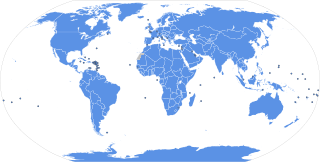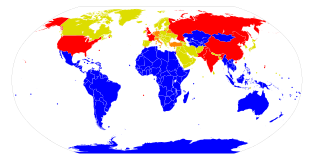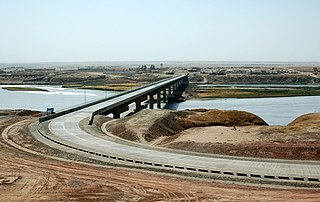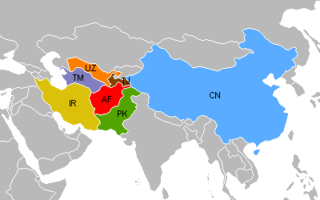
The United Nations member states are the 193 sovereign states that are members of the United Nations (UN) and have equal representation in the UN General Assembly. The UN is the world's largest intergovernmental organization.

A United Nations Security Council resolution is a United Nations resolution adopted by the fifteen members of the Security Council (UNSC); the United Nations (UN) body charged with "primary responsibility for the maintenance of international peace and security".
The United Nations Mission of Observers in Tajikistan (UNMOT) was a peacekeeping mission established by the United Nations Security Council in December 1994 and extended on several occasions until its mandate expired in May 2000. Its purpose was to monitor peace agreements during and after the Tajikistan Civil War. The observers were first deployed in the wake of the ceasefire, in 1994, between the ruling government of Tajikistan, led by Emomali Rahmonov, and the United Tajik Opposition. After the UN-sponsored armistice ended the war in 1997, the UN expanded the mission's original mandate to monitor the peace and demobilization. The mission was headquartered in Dushanbe, Tajikistan.

The Central Asian Nuclear-Weapon-Free Zone (CANWFZ) treaty is a legally binding commitment by Kazakhstan, Kyrgyzstan, Tajikistan, Turkmenistan, and Uzbekistan not to manufacture, acquire, test, or possess nuclear weapons. The treaty was signed on 8 September 2006 at Semipalatinsk Test Site, Kazakhstan, and is also known as Treaty of Semipalatinsk, Treaty of Semei, or Treaty of Semey.

United Nations Security Council resolution 968, adopted unanimously on 16 December 1994, after noting statements by the president of the security council and reports by the Secretary-General Boutros Boutros-Ghali on the situation in Tajikistan, the council established the United Nations Mission of Observers in Tajikistan (UNMOT) and addressed the process of national reconciliation in the country.

United Nations Security Council resolution 999, adopted unanimously on 16 June 1995, after recalling Resolution 968 (1994) on the situation in Tajikistan, the Council extended the mandate of the United Nations Mission of Observers in Tajikistan (UNMOT) until 15 December 1995 and addressed the process of national reconciliation in the country.

United Nations Security Council resolution 1030, adopted unanimously on 14 December 1995, after recalling previous resolutions 968 (1994) and 999 (1995) on the situation in Tajikistan, the Council extended the mandate of the United Nations Mission of Observers in Tajikistan (UNMOT) until 15 June 1996 and addressed the process of national reconciliation in the country.

United Nations Security Council resolution 1061, adopted unanimously on 14 June 1996, after recalling all resolutions on the situation in Tajikistan and the Tajik-Afghan border, the Council extended the mandate of the United Nations Mission of Observers in Tajikistan (UNMOT) until 15 December 1996 and addressed efforts to end the conflict in the country.

United Nations Security Council resolution 1076, adopted unanimously on 22 October 1996, after considering the situation in Afghanistan, resolutions by the General Assembly and the Joint Declaration made on 4 October 1996 by the leaders of Kazakhstan, Kyrgyzstan, Russia, Tajikistan and Uzbekistan on developments in the country, the Council discussed the deteriorating political, military and humanitarian situation in Afghanistan.

United Nations Security Council resolution 1089, adopted unanimously on 13 December 1996, after recalling all resolutions on the situation in Tajikistan and the Tajik-Afghan border, the Council extended the mandate of the United Nations Mission of Observers in Tajikistan (UNMOT) until 15 March 1997 and addressed efforts to end the conflict in the country.

United Nations Security Council resolution 1099, adopted unanimously on 14 March 1997, after recalling all resolutions on the situation in Tajikistan and the Tajik-Afghan border, the Council extended the mandate of the United Nations Mission of Observers in Tajikistan (UNMOT) until 15 June 1997 and addressed efforts to end the conflict in the country.

United Nations Security Council resolution 1113, adopted unanimously on 12 June 1997, after recalling all resolutions on the situation in Tajikistan and the Tajik-Afghan border, the Council extended the mandate of the United Nations Mission of Observers in Tajikistan (UNMOT) for a period of three months until 15 September 1997.

United Nations Security Council resolution 1128, adopted unanimously on 12 September 1997, after recalling all resolutions on the situation in Tajikistan and along the Tajik-Afghan border, the Council extended the mandate of the United Nations Mission of Observers in Tajikistan (UNMOT) for a period of two months until 15 November 1997.

United Nations Security Council resolution 1138, adopted unanimously on 14 November 1997, after recalling all resolutions on the situation in Tajikistan and along the Tajik-Afghan border, the Council expanded and extended the mandate of the United Nations Mission of Observers in Tajikistan (UNMOT) until 15 May 1998.

United Nations Security Council resolution 1167, adopted unanimously on 14 May 1998, after recalling all resolutions on the situation in Tajikistan and along the Tajik-Afghan border, the Council extended the mandate of the United Nations Mission of Observers in Tajikistan (UNMOT) for a further six months until 15 November 1998.

United Nations Security Council resolution 1206, adopted unanimously on 12 November 1998, after recalling all resolutions on the situation in Tajikistan and along the Tajik-Afghan border, the Council extended the mandate of the United Nations Mission of Observers in Tajikistan (UNMOT) for a further six months until 15 May 1999.
United Nations Security Council resolution 1240, adopted unanimously on 15 May 1999, after recalling all resolutions on the situation in Tajikistan and along the Tajik-Afghan border, the Council extended the mandate of the United Nations Mission of Observers in Tajikistan (UNMOT) for a further six months until 15 November 1999.

United Nations Security Council resolution 1274, adopted unanimously on 12 November 1999, after recalling all resolutions on the situation in Tajikistan and along the Tajik-Afghan border, the Council extended the mandate of the United Nations Mission of Observers in Tajikistan (UNMOT) for a further six months until 15 May 2000 and addressed preparations for upcoming parliamentary elections in the country.

United Nations Security Council resolution 1453, adopted unanimously on 24 December 2002, after reaffirming all resolutions on the situation in Afghanistan, the Council endorsed the "Kabul Declaration on Good-Neighbourly Relations" signed by the Afghan government and six neighbouring countries on 22 December 2002.















